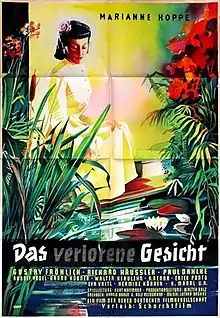| The Lost Face | |
|---|---|
 | |
| German | Das verlorene Gesicht |
| Directed by | Kurt Hoffmann |
| Written by | Harald Braun Rolf Reissmann |
| Produced by | Walter Bolz Harald Braun |
| Starring | Marianne Hoppe Gustav Fröhlich Richard Häussler |
| Cinematography | Franz Koch |
| Edited by | Adolf Schlyssleder |
| Music by | Lothar Brühne |
Production company | Neue Deutsche Filmgesellschaft |
| Distributed by | Schorcht Filmverleih |
Release date |
|
Running time | 98 minutes |
| Country | Germany |
| Language | German |
The Lost Face (German: Das verlorene Gesicht) is a 1948 German drama film directed by Kurt Hoffmann and starring Marianne Hoppe, Gustav Fröhlich and Richard Häussler. The plot of a woman with two divided personalities caused by a recent trauma drew inspiration from the Gainsborough Melodrama Madonna of the Seven Moons which had been extremely popular on its release in Germany.[1]
It was made at the Bavaria Studios in Munich with location shooting taking place in Heidelberg. The film's sets were designed by the art director Hans Kuhnert.
Synopsis
In Stuttgart a lost and disorientated young woman is found. It is assumed she is from Tibet. She receives care from a doctor and falls in love with a lawyer. Yet suddenly her face and voice change and she emerges as a completely different woman.
Cast
- Marianne Hoppe as Johanna Stegen
- Gustav Fröhlich as Dr. Thomas Martin
- Richard Häussler as Robert Lorm
- Paul Dahlke as Axel Witt
- Hermine Körner as Frau von Aldenhoff
- Harald Mannl as Leo L'Arronge
- Rudolf Vogel as Professor Kersten
- Walter Kiaulehn as Anstaltsarzt
- Erich Ponto as Wissenschaftler
- Bruno Hübner as Bildhauer
- Herbert Weicker as Dr. Rasan
- Ruth Killer as Sonja
- Eva Vaitl as Dame
- Helmuth Renar as Geheimrat Winter
References
- ↑ Bergfelder p.31
Bibliography
- Bergfelder, Tim. International Adventures: German Popular Cinema and European Co-Productions in the 1960s. Berghahn Books, 2005.